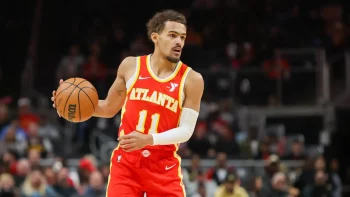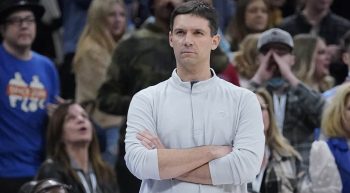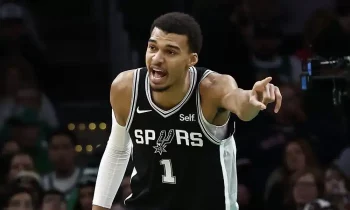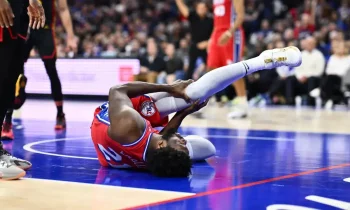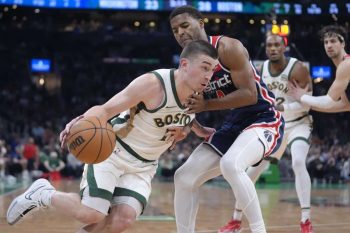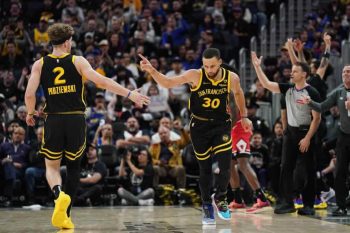NBA
NBA PM: NBPA, Commissioner Exchange Barbs

NBPA, Commissioner Exchange Barbs
The NBA’s current Collective Bargaining Agreement runs through the 2016-17 season, after which both the owners and players have the ability to opt out. It’s become a foregone conclusion that the players will call for the opt out due to the significant increase in the league’s profitability. For those who are hoping for no lockout, 2017 can’t get here slow enough because Michele Roberts, the NBPA’s new director, is already calling for significant changes to be made.
“Why don’t we have the owners play half the games?” Roberts said to ESPN The Magazine. “There would be no money if not for the players. Let’s call it what it is. There. Would. Be. No. Money. Thirty more owners can come in, and nothing will change. These guys [the players] go? The game will change. So let’s stop pretending.
“I don’t know of any space other than the world of sports where there’s this notion that we will artificially deflate what someone’s able to make, just because, it’s incredibly un-American. My DNA is offended by it.”
NBA Commissioner Adam Silver was quick to respond, and disagree with Roberts.
“We couldn’t disagree more with these statements,” Silver said in a statement. “The NBA’s success is based on the collective efforts and investments of all of the team owners, the thousands of employees at our teams and arenas, and our extraordinarily talented players. No single group could accomplish this on its own. Nor is there anything unusual or ‘un-American’ in a unionized industry to have a collective system for paying employees – in fact, that’s the norm.
“The Salary Cap system, which splits revenues between team owners and players and has been agreed upon by the NBA and the Players Association since 1982, has served as a foundation for the growth of the league and has enabled NBA players to become the highest paid professional athletes in the world. We will address all of these topics and others with the Players Association at the appropriate time.”
While Roberts started off on the basketball related income (BRI), which currently anywhere from 49-51 percent goes to the players with the rest going to the owners, she also voiced serious issues with the rookie pay scale, age limit and – most importantly – the notion that some NBA teams are still losing money, which was the driving cause behind the 2011 lockout.
“I can’t understand why the [players’ association] would be interested in suppressing salaries at the top if we know that as salaries at the top have grown, so have salaries at the bottom,” Roberts said. “If that’s the case, I contend that there is no reason in the world why the union should embrace salary caps or any effort to place a barrier on the amount of money that marquee players can make.
“It doesn’t make sense to me that you’re suddenly eligible and ready to make money when you’re 20, but not when you’re 19, not when you’re 18,” she said. “I suspect that the association will agree that this is not going to be one that they will agree to easily. There is no other profession that says that you’re old enough to die but not old enough to work.
“I initially just started laughing [when she heard one-third of teams were supposedly still losing money], to be honest with you. I know that as a result of the last CBA, at least 1.3 billion dollars in revenue that would have otherwise been on the players’ side is now on the owners’ side. I see the valuations of these teams going through the roof. How much more do you need to make money?”
“No one wants to say it out loud, but it’s a monopoly. And were there alternatives, they wouldn’t get away with it. “I’ll give the league credit,” she added. “They have done a great job controlling the narrative.”
All signs point to the 2017 labor negotiations being just as, if not more, tense and complicated than the ones in 2011 that led to the cancellation of 16 games.
Ronnie Price Suspended
Los Angeles Lakers guard Ronnie Price has been suspended one game without pay for hitting New Orleans Pelicans guard Austin Rivers on the side of the head with his right forearm as Rivers elevated for a layup, it was announced today by Rod Thorn, President, Basketball Operations.
The incident, for which Price was assessed a Flagrant Foul 2 and ejected, occurred with 9:11 remaining in the fourth quarter of the Lakers’ 109-102 loss to the Pelicans.
Price will serve his suspension on Friday, Nov. 14, when the Lakers host the San Antonio Spurs at Staples Center.
All-Star Voting Changes
For the first time, the NBA All-Star Ballot presented by Sprint will feature all NBA players, NBA President, Basketball Operations Rod Thorn announced today.
The NBA All-Star Ballot presented by Sprint had previously been determined by a panel of broadcasters and media members who cover the NBA, and contained 60 players from each conference. Fans will continue to select two guards and three frontcourt players when choosing the starters for the 2015 NBA All-Star Game, but will now be afforded the opportunity to choose from the entire NBA player pool, as opposed to 36 frontcourt players and 24 guards per conference.
“Our players are the most exciting athletes in the world,” Thorn said. “Our choice to include all NBA players is both a tribute to their skills and achievements, and another way to engage our fans in the full experience of NBA All-Star by giving them every option.”
Updating the official ballot on NBA.com to include all NBA players will complement the options afforded by the NBA’s all-digital voting program, which also includes Facebook, Twitter, Instagram, SMS, NBA Game Time and NBA Game Time from Sprint applications, as well as Sina Weibo and Tencent Microblog in China.
NBA All-Star Balloting 2015 presented by Sprint tips off Thursday, Dec. 11.
